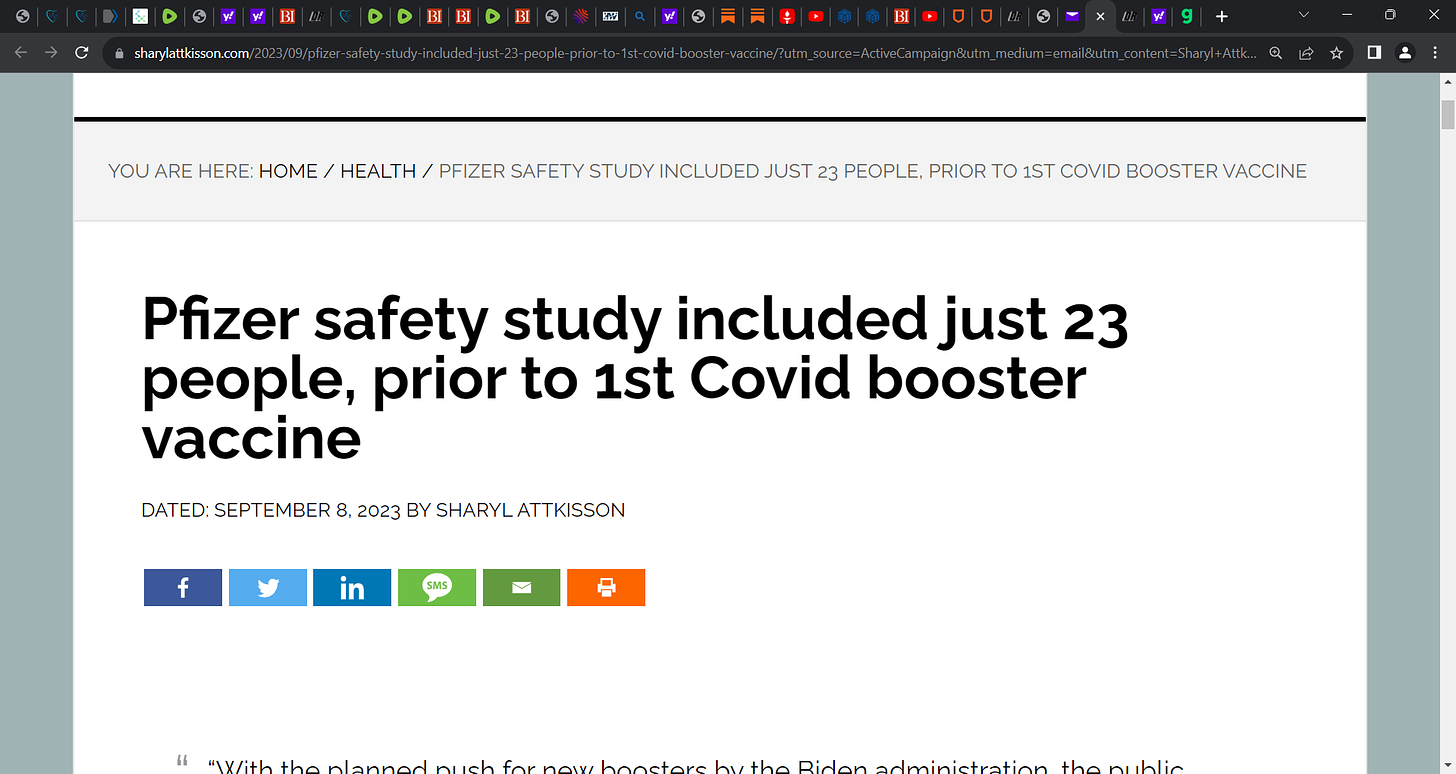Troubling: 'Pfizer safety study included just 23 people, prior to 1st Covid booster vaccine'; Fitton: "With the planned push for new boosters by the Biden administration, the public would do well to
by Paul Alexander
...examine these troubling documents about the shotgun approval of prior Covid boosters.” Tom Fitton, Judicial Watch; a Pfizer study surveyed 23 people in 2021 to gauge reactions to its Covid vaccine
https://sharylattkisson.com/2023/09/pfizer-safety-study-included-just-23-people-prior-to-1st-covid-booster-vaccine/?utm_source=ActiveCampaign&utm_medium=email&utm_content=Sharyl+Attkisson+Daily+Newsletter&utm_campaign=Daily+Newsletter
‘Judicial Watch has released the 58 pages of records from the U.S. Food and Drug Administration (FDA) showing that a Pfizer study surveyed 23 people in 2021 to gauge reactions to its Covid vaccine booster before asking the FDA to approve it.
The FDA indicated that this production of records “represents our complete response to your request; no additional productions are anticipated.”
The records were obtained in response to a March 2022 lawsuit filed after the Department of Health and Human Services failed to respond to an August 2021 Freedom of Information Act (FOIA) request for records “submitted by Pfizer and BioNTech to the FDA, including BARDA, relating to ‘booster’ vaccinations for the SARS-CoV-2 virus.”
Biomedical Advanced Research and Development Authority, BARDA, has been heavily involved with the development of the Covid-19 vaccine. According to its website:
The Biomedical Advanced Research and Development Authority (BARDA) provides an integrated, systematic approach to the development of the necessary vaccines, drugs, therapies, and diagnostic tools for public health medical emergencies such as chemical, biological, radiological, and nuclear (CBRN) accidents, incidents and attacks; pandemic influenza (PI), and emerging infectious diseases (EID).
BioNTech is a German pharmaceutical company that partnered with Pfizer in developing the original vaccine.
The records include a July study titled “Phase 1 Booster Safety and Immunogenicity Data up to 1 Month Post-Dose 3 of BNT162b2 30 µg [micrograms] in Study C4591001” provided “preliminary safety and immunogenicity data” for a group that had received two vaccine shots and, seven to nine months later, a third (booster) shot:
This submission includes preliminary findings from a subset of younger (18 to 55 years of age) and older (65 to 85 years of age) participants in the Phase 1 part of Study C4591001 who completed the initial two-dose series of BNT162b2 30 µg, given approximately 3 weeks apart, and then received a third dose (booster) of BNT162b2 30 µg approximately 7 to 9 months after the second dose. Data were collected through the cutoff date of 13 May 2021.
The participants were evaluated for symptoms up to one month after the booster shot. The booster’s immunogenicity, or how well a vaccine works over time, was evaluated seven days and one month after the booster:
SARS-CoV-2 50% neutralization titers were assessed in sera drawn before BNT162b2 Dose 1 (on Day 1); 7 days and 1 month after BNT162b2 Dose 2; before Dose 3; and 7 days and 1 month after Dose 3.
The participants included 11 people aged 18 to 55 and 12 people aged 65 to 85.
Of the younger group, there were nine females and two males; eight of whom were white, one was black and two were Asian. Of the older group six were female, six were males, and all were white.
The study reports that a booster dose increases the breadth of neutralizing response against SARS-CoV-2 variants and that the data suggests that a third dose could prolong protection and further increase the breadth of protection:
[T]he durability of protection from vaccination and the required frequency of booster doses are unknown at this time. To date, results from the global Phase 1/2/3 study of BNT162b2 indicate robust protection lasting at least 6 months, despite modest waning of immunity over time. Booster doses have the potential to keep protection high if immunity continues to decline over time.
This Pfizer study was sent to Marion Gruber, PhD, director of the Office of Vaccines Research and Review.
An August 13, 2021, FDA-CBER (Center for Biologics Evaluation and Research) report is titled “Phase 1 Booster (Dose 3) Immunogenicity at 1 Month Post-Dose 3 in Study C4591001: SARS-CoV-2 Wild-Type and Delta Variant Neutralization Data.”
On August 24, 2021, the White House stated it was moving “aggressively” to roll out booster shots despite not yet receiving clearance from the FDA to give everyone third doses.
Shortly thereafter, it was reported that Gruber and her deputy, Phil Krause, were leaving the agency because they were frustrated with Centers for Disease Control (CDC) and Biden White House interference in vaccine decisions.
Gruber and Krause were among a group of resigning doctors who agreed that “Available evidence doesn’t yet indicate a need for Covid-19 vaccine booster shots among the general population …”
On September 21, 2021, just over a month after Pfizer’s second submission, the FDA approved a single booster dose of the Pfizer-BioNTech vaccine for those over 65, for those 18 to 64 at a high risk of severe Covid-19, and for those whose frequent institutional or occupational exposure puts them at high risk of serious complications of Covid-19.
The FDA said it based its decision on the documents presented by Pfizer, as well as input from the CDC, the Israeli Ministry of Health and the University of Bristol in the UK.
Three weeks after approval, about 8.9 million boosters had been administered.’

